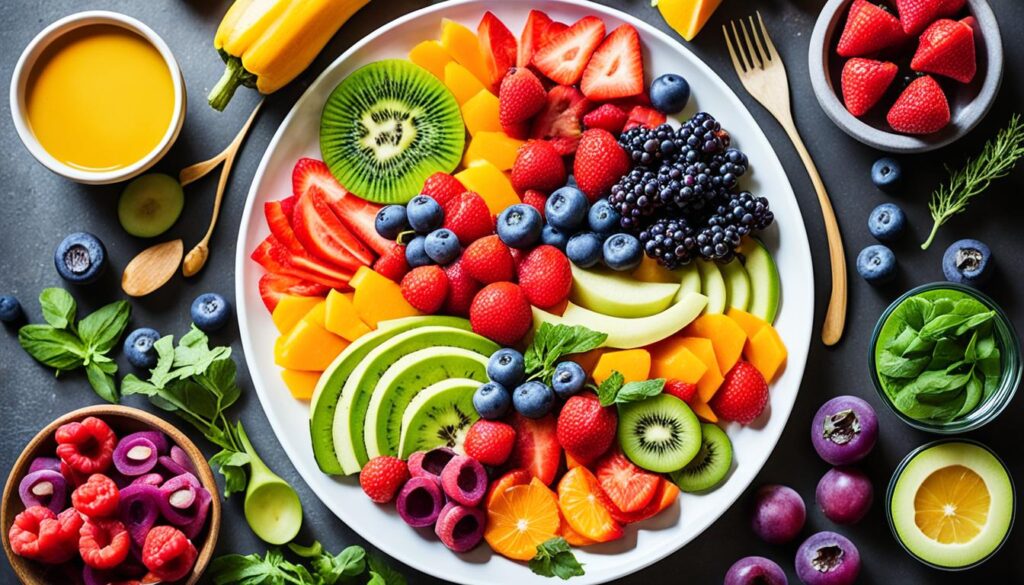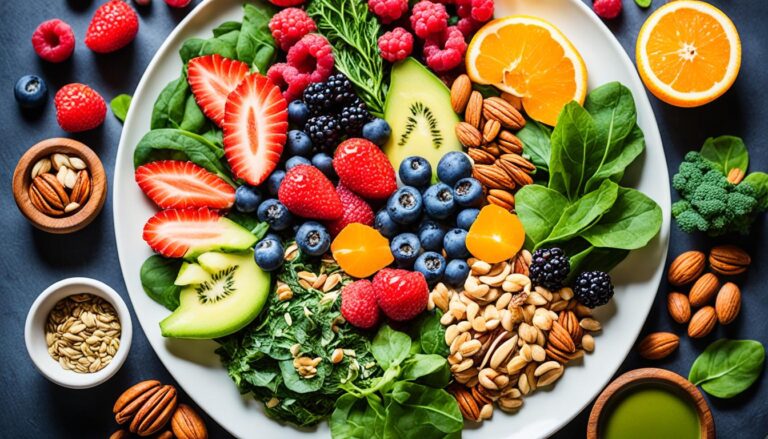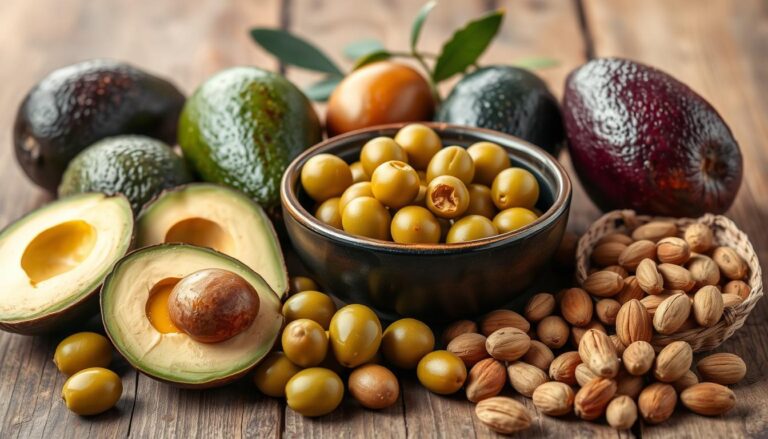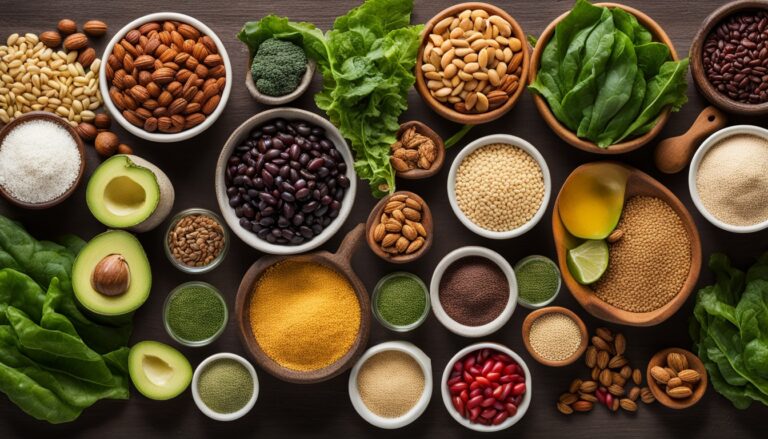Are you tired of trying fad diets that promise quick results but leave you feeling frustrated and unsatisfied?
Buckle up because we’re about to unveil the secrets to rapid weight loss that actually work. Forget the gimmicks and get ready to embark on a journey towards a healthier happier you.
Key Takeaways
- Ditch the diet mentality and focus on sustainable lifestyle changes.
- Set SMART Specific Measurable Achievable Relevant Time Bound goals and reward yourself along the way.
- Aim for a safe and steady weight loss of 1-2 pounds per week.
- Incorporate a balance of diet, exercise, and healthy habits for lasting results.
- Prioritize protein, whole foods, and hydration to support your weight loss journey.
Implement Long Term Lifestyle and Behavior Changes
For lasting weight loss focus on lifestyle changes, not short term diets. Experts say diet can be negative and make you obsessed with food. Instead, see weight loss as a journey to better health and wellness.
Set SMART Goals and Reward Yourself
Setting SMART goals specific measurable achievable relevant, and time sensitive is a great strategy. These goals keep you motivated and on track. When you reach your goals reward yourself in a way that feels good. Studies show small rewards for reaching smaller goals work better than big rewards that require a lot of effort.
For instance aim to walk 2,000 more steps each day for two weeks. Then treat yourself to a spa day. This method encourages positive habits for sustainable weight loss and lifestyle changes.
The main goal is behavior modification and building healthy habits you can keep. Focus on your overall health and well being. This way, losing weight will come naturally.
Successful weight managers tend to focus on dietary and physical activity changes that lead to long-term weight change.
Focus on the First 5% to 10% Weight Loss
Experts say it’s better to aim for modest weight loss goals instead of big changes. Losing 5-10% of your body weight can greatly improve your health and lower the risk of chronic diseases. This method is easier to keep up with and sets you up for lasting success.
Studies show a safe and lasting weight loss is about 1/2 pound to 2 pounds each week. You might lose more at first then less, but it’s all part of the process. Think of it as a staircase, not a straight line.
Keeping track of what you eat and your weight loss progress helps a lot. A 2021 study found that monitoring your weight leads to better results. Don’t go on crash diets. Aim to lose 5% to 10% of your body weight at a time. After six months, you can aim for another 5% to 10%.
Exercise is key for keeping the weight off along with eating right. Building muscle can change your body composition and keep you motivated. Tracking your progress by measuring your waist and taking photos can also be helpful.
| Weight | 5% Weight Loss | 10% Weight Loss |
|---|---|---|
| 150 lbs | 7.5 lbs | 15 lbs |
| 200 lbs | 10 lbs | 20 lbs |
| 250 lbs | 12.5 lbs | 25 lbs |
Even losing just 5% of your weight can make a big difference in your health. By setting realistic goals tracking your progress, and making small changes you can start a lasting weight loss journey. This approach helps you enjoy the health benefits and chronic disease risk reduction.

Reduce Intake of Ultra Processed Carbs and Sweets
When trying to lose weight, what you eat matters a lot. Cutting back on foods like sugary snacks and processed carbs can help you lose weight faster. Avoiding ultra-processed foods like French fries and chips can also boost your weight loss.
Ultra-processed foods often have many additives not found in homemade meals. These foods can lead to health issues including obesity and cancer. The American Heart Association suggests limiting added sugars to 6 teaspoons a day for women and 9 teaspoons for men. But Americans eat about 17 teaspoons a day on average.
To help with weight loss, eat fewer processed carbs and sweets. Choose complex carbs like whole grains vegetables legumes nuts, and fruits instead. These foods keep you full longer and give you energy and health benefits.
| Unhealthy Carbs to Limit | Healthier Carb Alternatives |
|---|---|
| White bread bagels, and rolls | Whole wheat bread brown rice quinoa |
| White pasta and refined flour products | Whole-wheat pasta zucchini noodles, spaghetti squash |
| Sugary cereals and granola bars | Oatmeal Greek yogurt with berries nut based bars |
| Potato chips French fries crackers | Roasted vegetables, air-popped popcorn veggie chips |
By choosing healthier options and eating fewer ultra-processed foods and high glycemic carbs, you can speed up your weight loss. A diet full of whole nutrient rich foods is key for lasting success.
The quality of the calories you consume is just as important as the quantity when it comes to weight loss and overall health.
Eat More Plants
Looking to lose weight? A plant-based diet could be your key. Studies show that eating whole foods from plants helps people lose more weight and keep it off. On average people can lose between 3 to 20 pounds by eating this way.
Plant-based diets work well for weight loss because of fiber and water. Fruits vegetables, legumes, and whole grains are full of these nutrients. Fiber makes you feel full by slowing down nutrient absorption. And the water in these foods adds volume without extra calories.
- A whole-foods, plant-based diet helped participants lose an average of 25 lbs over 1 year.
- People on plant based diets lost about 4.5 lbs more than those on non-vegetarian diets over 18 weeks.
- A shift to sustainable, plant-based eating can reduce greenhouse gas emissions, land use, and water use by up to 70%.
Eating more fruits, vegetables, whole grains, legumes, and nuts can make your diet tasty and full of nutrients. It’s great for losing weight. Plus, it can lower your risk of heart disease, diabetes, and some cancers. So why not try it? Your waistline and health will appreciate it.

Read more: Diabetes 101 Crafting a Personalized Diabetes Plan
Pump Up Your Protein
Protein is key for losing weight and keeping muscle mass. Try to get 25-30 grams of protein in each meal. This helps control hunger and keep muscles strong.
Animal proteins are easy for the body to use. For instance, egg whites give more protein than plant sources. Eating different proteins throughout the day is good for your health.
Protein is vital for losing weight. It keeps you full and helps build or keep muscle. Protein also burns calories during digestion, more than carbs do.
Protein requires 20-30% of its usable energy to be expended for metabolism, compared to 5-10% for carbs and 0-3% for fats.
Focus on protein intake to manage your appetite and save your muscle mass while losing weight. A balanced protein intake is crucial for reaching your goals.
Drink More Water
Drinking enough water is key for your health and weight loss. Studies link good water intake with losing weight successfully.
Research shows that drinking two cups of water before meals can make you eat 22% less. Switching sugary drinks to water helps overweight people lose weight. Drinking two cups of water can also boost your metabolism by 30% on average.
The 8 by 8 rule suggests drinking 8 ounces of water 8 times a day. But there’s more to it. Drinking two cups of water before meals can help with weight loss by making you feel full and eating less.
Drinking enough water also helps with kidney function, blood pressure, and skin health. Not drinking enough water can hurt your brain function and focus.
Drinking more water is one of the simplest and most effective ways to support your weight loss journey. It’s a game changer that can help you feel more energized focused, and in control of your cravings. Nutrition Expert, Jane Doe
So if you want to lose weight drink up! Add more water to your daily routine and see how it changes your waistline and health.

Staying hydrated is more than just drinking when you’re thirsty. It’s a key part of a healthy life and helps with weight loss. Use the power of water to support your journey to a slimmer healthier you.
Eat a Well Rounded Breakfast
Skipping breakfast can harm your weight loss efforts. Studies show that skipping meals leads to weight gain and poor diet quality. A balanced breakfast with protein healthy fats, and quality carbs like fresh berries is key. This mix boosts your focus, energy, and mood.
The Importance of Breakfast
Breakfast is crucial for a good start to the day. A nutritious breakfast can:
- Boost your energy levels and mental focus
- Help maintain blood sugar balance, preventing energy crashes and overeating later in the day
- Provide essential vitamins minerals, and antioxidants for health and wellness
- Support weight management efforts by controlling appetite and regulating hunger hormones
Starting with a balanced breakfast sets you up for success. It helps you make healthy choices all day.
Building a Balanced Breakfast
For a nutritious breakfast include these items:
- Protein e.g. eggs, Greek yogurt nut butter lean meats
- Healthy fats e.g. avocado nuts seeds olive oil
- Quality carbs e.g. oats, berries whole grain toast
This mix of nutrients keeps your blood sugar stable. It helps you feel full and satisfied. Eating a variety of foods also boosts nutrient density and supports weight loss goals.
A balanced breakfast is key to a healthy life and can change your weight loss journey. Prioritizing it means feeling great all day.
Stand Up and Move More
One of the easiest ways to lose weight is to boost your non-exercise activity thermogenesis NEAT. This is the energy you use for all activities not related to eating sleeping, or exercising.
Simple actions like carrying groceries taking the stairs, or tapping your toe can burn hundreds of extra calories daily. Studies prove that switching from sitting to standing can help burn more calories and lose pounds.
Maximize Your NEAT
- Take the stairs instead of the elevator whenever possible.
- Park further away from your destination and walk the extra distance.
- Fidget, tap your foot, or stand while on the phone.
- Do household chores like cleaning or gardening.
- Go for a walk during your lunch break or after dinner.
By changing your daily habits, you can greatly increase your non-exercise activity and energy expenditure. This leads to lasting weight loss without needing intense workouts.
| Activity | Calories Burned per Hour for a 150-lb person |
|---|---|
| Standing | 100-200 calories |
| Household Chores | 150-300 calories |
| Brisk Walking | 200-300 calories |

Read more: 5 minutes of activity to improve the brain
Adding more non-exercise activity to your day is a simple yet powerful way to increase your calorie burn. It supports your weight loss journey. Every step you take matters!
Hit the Weights
Strength training is a key part of losing weight. It helps you build lean muscle mass. This increases your resting metabolic rate RMR and helps you burn more calories, even when you’re not moving.
Studies show that weightlifting can help you burn more calories. This is because muscle tissue burns more calories than fat tissue. The more muscle you have the higher your RMR will be. This means you’ll burn fat more efficiently.
As you get older, it’s crucial to focus on strength training. Our muscle mass naturally decreases with age, leading to weight gain. So, building muscle helps prevent this weight gain.
Reap the Benefits of Strength Training
Strength training doesn’t just burn calories during the workout. It also keeps your metabolism high for hours after. Adding cardio to your strength training routine can lead to better weight loss over time. Try to do resistance exercises 2-3 times a week covering all major muscle groups.
- Build muscle mass to boost your resting metabolic rate
- Enjoy the afterburn effect that continues to burn calories after your workout
- Combine strength training with cardio for optimal weight loss results
Building muscle takes time and consistency. Beginners often gain muscle faster than those with more experience. A 12 to 16-week program can help you gain 5 to 10 pounds of muscle. With dedication and proper nutrition, strength training can help you achieve your weight loss goals.
Strength training can help counteract the decline in metabolism and muscle mass that occurs with age, potentially contributing to middle-age weight gain.
| Benefit | Impact |
|---|---|
| Increased muscle mass | Boosts resting metabolic rate, leading to more calories burned at rest |
| Afterburn effect | Elevated metabolism continues for hours after a strength training session |
| Combination with cardio | Leads to better long-term weight loss results |
Don’t Go Overboard
Many people try to lose weight by cutting calories or working out too much. But, this can actually stop you from losing weight. The key to losing weight for good is to balance stress and recovery.
Working out too much can hurt your body and mind. It can make you tired, sore, and even injured. This makes it hard to keep up with exercise and eat well. Too much stress can also mess with your hormones slowing down your metabolism and making weight loss harder.
The Power of Rest and Recovery
Experts say you need enough time to recover for lasting results. This time lets your body build muscle and burn fat, helping you lose weight for good. Here are some tips to balance your efforts:
- Try to walk 10,000 steps a day but don’t overdo it. Add more activity like walking, gardening, or taking the stairs.
- Drink at least half your body weight in ounces of water daily to stay hydrated and support your body.
- Focus on strength training to build muscle. This can help you burn more calories even when you’re not moving.
- Think about getting help from a weight loss expert or joining a group to stay motivated and on track.
Remember, losing weight is a journey, not a race. Listen to your body, recover well, and make slow, healthy changes. This will help you become leaner and more energetic.
The secret to sustainable weight loss is finding the right balance between stress and recovery.

Read more: Stay Motivated on Your Weight Loss Journey
How to Lose Weight Fast
Losing weight quickly and safely means making changes in your diet, being more active, and changing your lifestyle. By doing these things together, you can lose weight in a healthy way that lasts.
Dietary Modifications for Fast Weight Loss
Start by eating fewer ultra-processed carbs and sweets. Choose whole foods like fruits, veggies, and lean proteins instead. Eating more protein can help control hunger and make you feel full. Drink lots of water to stay hydrated.
Boost Your Physical Activity
Make exercise a regular part of your life. Aim for 150 minutes of moderate exercise or 75 minutes of intense workouts each week. Strength training helps keep your muscle mass while losing weight, which is good for your metabolism.
Adopt Sustainable Lifestyle Changes
Change your daily habits slowly and for the long term, not just for a short time. Getting enough sleep and managing stress are key to controlling your weight. Pay attention to when you’re hungry or full to eat better.
Using these methods, you can lose weight safely and in a way that lasts. Remember, be patient and focus on making lasting changes, not quick fixes.
| Weight Loss Strategy | Description | Effectiveness |
|---|---|---|
| Intermittent Fasting | Fasting for specific periods, such as 16 hours a day or 2 days a week, and eating during the remaining hours/days. | Several studies have shown intermittent fasting can be as effective for weight loss as a daily low-calorie diet. |
| Tracking Diet and Exercise | Monitoring food intake, physical activity, and other health metrics to promote behavioral changes and increase motivation. | Research suggests that tracking can be helpful for weight loss, as it encourages mindful eating and exercise habits. |
| High-Protein Diet | Consuming a diet rich in protein-rich foods, which can help regulate appetite hormones and promote feelings of fullness. | A high-protein diet, combined with a lower glycemic index, has been shown to be effective for weight loss over 6-12 months. |
Losing weight safely typically involves losing 1-2 pounds per week. Losing 20 pounds within about 5 months at 1 pound per week or 2 1/2 months at about 2 pounds per week is achievable.
Conclusion
Losing weight quickly and safely is tough but it’s doable with the right strategies and a commitment to lasting lifestyle changes. By focusing on the first 5-10% of weight loss cutting down on ultra processed carbs and sweets eating more plant-based foods increasing your protein staying hydrated, and adding strength training you’re on the right track.
Remember, losing weight is a journey not just a goal. It takes patience and consistency. The path to a healthier you may have ups and downs. But with the expert tips in this article you can learn how to lose weight fast and keep it off.
So, what are you waiting for? Start using these weight loss tips today. Take the first step towards a fitter, healthier you. The benefits of being slimmer and more confident are totally worth it.





